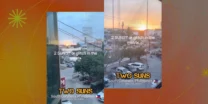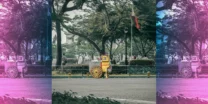CHINA has been experiencing an unprecedented surge of COVID-19 cases since it abandoned the draconian zero Covid policy a few weeks ago.
But it will not stop President Ferdinand “Bongbong” Marcos Jr., the first head of state to travel to China in 2023, to go ahead with his state visit.
Instead, Marcos Jr. and his delegation will be put in a “bubble” – they can only meet people who are previously quarantined, and there will be no room for post-Christmas shopping.
Surge in China’s COVID-19 cases
Like the rest of the world, China has been badly bruised by the COVID-19 pandemic. After the three-month strict lockdown in Wuhan, they implemented a zero-COVID policy in all communities. They are so strict that an entire building, a village, or a city will be locked down for every positive case, regardless of the situation the people were in. If they are inside a building and there is no food, they are stuck until people are tested and cleared for the next days or so.
However, like most countries, China had to contend with the dilemma of public health and freedom of movement. Late this year, civil unrest tested Chinese President Xi Jinping’s zero-COVID policy. The Chinese leadership had to abandon the zero Covid policy and ease controls to appease the growing civil disobedience.
On December 2, 2022, China recorded one of the highest number of new COVID positive cases in one day – 62,439. Compared to February 2020, data for the past 28 days this December 2022 was also higher, with 715,287 cases and 937 deaths. For a country of 1.4 billion people, that’s a drop in the bucket. Or so it seems.
WHO meets China
The World Health Organization met China’s health authorities Saturday, December 30.
Reading between the lines, the WHO said the numbers China is giving might not reflect what’s happening on the ground. Practically, the WHO aired the same tune during the pandemic’s start in January 2020.
My latest #ThoughtofDayonChina: Fever meds in short supply, hospitals overwhelmed, blood shortage, death tolls soaring among the elderly, morgues overflown with body bags –Why China has a man-made crisis after "sudden reopening"https://t.co/j3y7I0z2nh pic.twitter.com/Hml9eLLChl
— Wang Xiangwei (@wangxiangweihk) December 22, 2022
The WHO said they asked China “again” for regular sharing of specific and real-time data on the epidemiological situation in China. They needed very particular data: genetic sequencing, disease impacts such as hospitalization, intensive care unit admissions, and death. They also asked for data on vaccinations delivered and vaccination status, especially in vulnerable people and those over 60 years old.
You may have seen these data (and maybe taken for granted) in the past two years from the Philippine Department of Health. They have the same data in their Whatsapp and other Weibo apps in China, but lately Chinese health authorities stopped publicizing the Covid-19 daily updates.
Why the need for real-time data? The WHO said they need “timely publication of data” from China for the global community to formulate accurate risk assessments and inform effective responses.
WHO again asked for regular sharing of specific & real-time data on epidemiological situation— incl more genetic sequencing data, data on disease impact incl. hospitalisations, ICU admissions & deaths— & data on vaccinations delivered & vaccination status. https://t.co/V3rJTAC9Tm
— World Health Organization (WHO) (@WHO) December 30, 2022
Beijing insisted they have been sharing “relevant information and data openly and transparently with the international community, including the WHO.”
Chinese Foreign Ministry spokesman Wang Wenbin said they share the data on the latest COVID cases in China to the Global Initiative on Sharing Avian Influenza Data (GISAID).
“The (Chinese) departments will continue to closely monitor whether the virus would mutate, share information on COVID in a timely, open, and transparent manner in accordance with the law, and work with the international community to address the COVID challenge,” he added.
Chinese authorities have shared the genome data of the virus from the latest COVID cases in China through GISAID. We will closely monitor the mutations, share information in a law-based, timely, open and transparent way, and work with the world to tackle the COVID challenge.
— Spokesperson发言人办公室 (@MFA_China) December 30, 2022
Starting January 8, China will stop quarantine measures imposed on all travelers arriving in China – both foreign and Chinese nationals.
PBBM visit to China
Against this backdrop, Marcos Jr. will visit China – his first non-Asean state visit – since his assumption of the presidency in 2022.
His state visit begins five days before China officially lifts the quarantine requirement for foreign nationals.
Despite the surge of COVID-19 cases in China, Manila and Beijing decided to push through with the state visit, Philippine Foreign Affairs Assistant Secretary Neal Imperial said.
“There are visits we cannot postpone,” Imperial said in a briefing Thursday at the Palace.
A bubble arrangement – similar to what was implemented here during the height of the pandemic crisis for sports events or taping of entertainment shows – will be enforced on the Philippine delegation.
The Philippine delegation will board a chartered flight by Philippine Airlines. They will not be quarantined, but their movement will be severely limited, and all the places where they will go should be “pre-arranged.”

“We have received assurances from the Chinese assuring the safety of the President and his delegation during the visit,” he said.
On January 3, Marcos Jr. will meet China’s three highest-ranking leaders – President Xi Jinping, Prime Minister Li Keqiang, and the chairman of the Standing Committee of the National People’s Congress, Li Zhanshu. Then President Xi will host a state banquet in the evening.

On January 4 and 5, the President will witness the signing of government and business deals.
Chinese business people attending Philippine business roundtables will be required to undergo quarantine for a few days before meeting President Marcos Jr., Imperial told republicasia.
As a result of the “bubble arrangement,” the Filipino community in China will not have the chance to meet President Marcos Jr.
“There will be no meeting with the Filipino community because of the situation there. Too bad. But we have to follow the COVID protocols in China, so there cannot be any big gatherings,” Imperial explained.
Aside from the President, other members of his delegation are First Lady Liza Araneta-Marcos, former President Gloria Macapagal-Arroyo, his cousin and House Speaker Martin Romualdez, Foreign Affairs Secretary Enrique Manalo, and the secretaries of Finance, Trade, Tourism, Information and Communications Technology.

The Philippine business delegation joining the President in China is “sizable.”
“China, after all, is our country’s largest trading partner, our largest source of imports, and second largest export destination,” Imperial added.
If any member of the Philippine delegation tests positive while in Beijing, Imperial said, they will undergo quarantine until they recover.
“We have to follow protocols and restrictions by the Chinese government for the delegation,” he added.
Both Manila and Beijing are making all arrangements “for every possible scenario,” which includes the possibility of the President himself, the First Lady, former President Arroyo, and Speaker Romualdez getting the coronavirus.
The President had caught a bad cold during his second day of the working visit to Brussels early this month.
During this Beijing visit, a freezing temperature will again greet the President. According to AccuWeather, the forecast in Beijing will be four °C to -10°C on January 3-5, 2023.
It looks like brutal winter and COVID-19 surges will not deter Marcos Jr. and Xi from heating the relations “warmed up” by President Duterte six years ago. Let’s hope that the only negative result from the visit would be the negative temperature and COVID tests.

Banner photo: Marcos Jr. and Xi first met at the sidelines of APEC Summit in Bangkok last November 2022 | courtesy Office of the President








